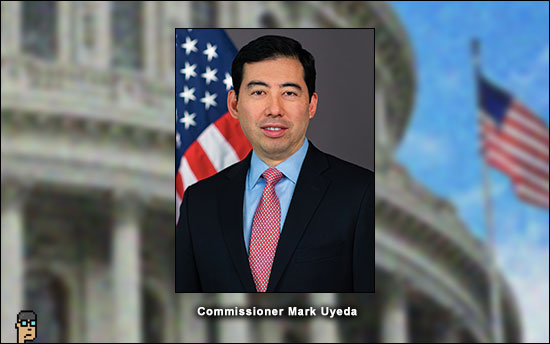One of the new Securities Exchange Commisssion (SEC) commissioners appointed last May, Mark Uyeda, said at this week’s “SEC Speaks 2022” conference that regulation by enforcement is not in the public’s interest for creating effective guardrails for crypto.
By doing so, Uyeda joins fellow SEC commissioner Hester Peirce in taking issue publicly with Chair Gary Gensler’s current approach for regulating cryptocurrency.
His view isn’t a total surprise given the politics. Gensler is part of the 3-2 Democrat majority on the SEC’s Commission. Uyeda is a Republican along with Peirce.
Nevertheless, Uyeda is not new to the inner-workings of the SEC having worked on its staff since 2006 as an advisor to Chairman Jay Clayton among others as well as serving a securities counsel to the Senate Committee on Banking, Housing, and Urban Affairs’ minority staff and as an advisor to House Speaker Nancy Pelosi (D, CA) according to Bloomberg.
The speech
Uyeda’s speech on crypto zeroed in on the potential loss of innovative firms in the United States. Just yesterday, Chair Gensler stated in answer to a related question by former Commerce Secretary Penny Pritzker at NYC Summit that innovation only occurs in the public sector with the help of academics and “tinkerers.” It was an awkward moment considering the room full of entrepreneurs gathered in front of him. Risk-taking entrepreneurs are often considered the heart of innovative products and companies in crypto or any industry.
(Excerpted text of the speech by Commissioner Uyeda)
Be Willing to Tackle the Big, Difficult, and Complex Issues
Today, one big, difficult, and complex issue that is conspicuously absent from the Commission’s published regulatory agenda is how to regulate crypto assets and related services. Market participants have expressed significant concerns regarding the lack of regulatory guidance in this space. There is a widespread concern that the lack of predictability with regard to our regulation may encourage crypto firms to relocate to other jurisdictions.
There are two major issues and areas of uncertainty: does the crypto asset constitute a security and, if so, how do market participants comply with the federal securities laws and the Commission’s rules. To date, the Commission’s views in this space have been more often expressed through enforcement action. This is an example of a situation where regulation through enforcement does not yield the outcomes achievable through a process that involves public comment.”
In addition to “public comment,” Uyeda added in his speech that the SEC “should consider proposing rules or issuing interpretive releases.”
This isn’t the first time that Uyeda has proposed public comment in order to establish SEC rules. Back in May, he expressed the need for public comment around bankruptcy risk that an SEC staff bulletin suggested Coinbase add to its filings. CoinDesk’s Jesse Hamilton reported, “Uyeda raised the point that adding any new policy at the SEC ‘that is effectively a rule’ needs to go through the proper notice-and-comment process as well as a formal vote.”
Commissioner Lizárraga
Joining Uyeda on the SEC’s 5-person commission this year is Jaime Lizárraga, – part of the 3-2 Democratic majority at the commission – who told senators during his confirmation hearing that he, too, believed in reasonable comment periods – though not specifically in reference to crypto.
Lizárraga said at the time, “… I do think it is important for stakeholders to have an opportunity to comment on these proposals. (…) … as a general matter, I believe in the principle of stakeholders having a meaningful opportunity to comment on these proposals.” To date, he has yet to say anything publicly as it relates to the SEC’s current regulation by enforcement of cryptocurrency companies.
Ultimately, the Chair controls the agenda at the SEC. But, a Commission with a block of three commissioners among five who oppose regulation by enforcement would be a huge shift.
There are now, clearly, at least two.

